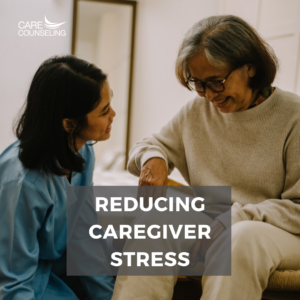Caregiver Depression
 It is painful to care for others while you are grieving the loss of what was and what used to be. It can be even more painful to witness firsthand the suffering your loved ones are experiencing while they are impacted by loss of mobility, memory, cognitive functioning, and declines in physical and mental capabilities.
It is painful to care for others while you are grieving the loss of what was and what used to be. It can be even more painful to witness firsthand the suffering your loved ones are experiencing while they are impacted by loss of mobility, memory, cognitive functioning, and declines in physical and mental capabilities.
Various forms of grief are present. For example, learning about a terminal illness can bring up anticipatory grief, as one begins to grieve before the loss. The shock of the diagnosis can be difficult as reality sets in. Those who are generally optimistic cling to hope and lean on support as they hope for the best… hope for a cure, hope for improvement in functioning, hope for a miracle. It can take time before coming to acceptance of where things are at, acceptance of what is, and the reality of acceptance of things within and not within your control.
Ambiguous loss of often present when caretaking for those with chronic medical conditions such as Alzheimer’s and Dementia since the loss of aspects of the person is felt, even those the person is still present physically.
- According to caregiver statistics, approximately 34.2 million Americans have provided unpaid care to an adult age 50 or older in the last 12 months. [National Alliance for Caregiving and AARP. (2015). Caregiving in the U.S.]
- Approximately 15.7 million adult family caregivers care for someone who has Alzheimer’s disease or a form of dementia. [Alzheimer’s Association. (2015). 2015 Alzheimer’s Disease Facts and Figures.]
Caretaking for a person with significant health-related needs can take its toll on mental health. The caregiver will experience a variety of thoughts and emotions while conditions such as Alzheimer’s progress. Underlying feelings such as anger, resentment, and abandonment may come to the surface, especially when caregiving for a spouse or partner who demands a significant time commitment, and the caregiver has limited resources for respite. You may find yourself becoming angry at people and sources of support that were once your strong foundation that is now shaken by suffering.
There may be conflicting feelings—loving the person and wanting them in your life but also having strong negative feelings and secretly wishing they were no longer in your life. Guilt can quickly set in along with questioning, regrets, and sadness. Anxiety and depression are often experienced. The cumulative impact of physical, emotional, and mental exhaustion from caretaking can result in caregiver burnout.
Signs that you may be depressed include decreased interest or pleasure in doing things you used to enjoy, frequent sad and crying, withdrawal from others, feelings of hopelessness experiencing changes in sleep, appetite, and activity levels, feelings of fatigue, emotional heaviness, and suicidal thoughts. If you are experiencing suicidal thoughts or are concerned that your feelings may harm the recipience of caretaking, please reach out for professional help and access your local crisis resources, including the Suicide and Crisis Lifeline 988. https://988lifeline.org/
It can be incredibly powerful to connect with people and supports who share values and experiences while you are caring for a loved one with chronic medical conditions. This includes family, friends, your local community, faith-based communities, spiritual resources, mental health support, and the medical community.
Check out some of the resources below for information related to specific medical conditions.
American Cancer Society: https://www.cancer.org/
American Heart Association: https://www.heart.org/
Alzheimer’s Foundation of America: https://alzfdn.org/
The ALS Association: https://www.als.org/
Parkinson’s Foundation: https://www.parkinson.org/
American Stroke Foundation: https://www.stroke.org/
National Multiple Sclerosis Society: https://www.nationalmssociety.org/
Center for Disease Control and Prevention: https://www.cdc.gov/
Written By: Charlotte Johnson, MA, LPCC



























